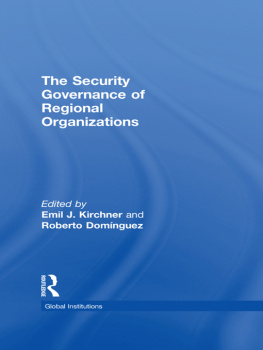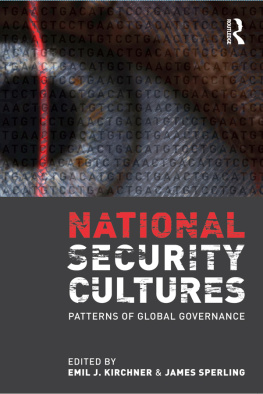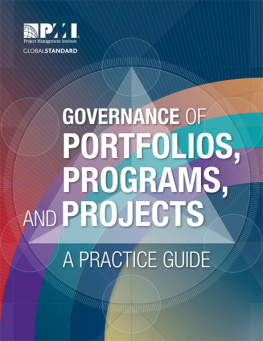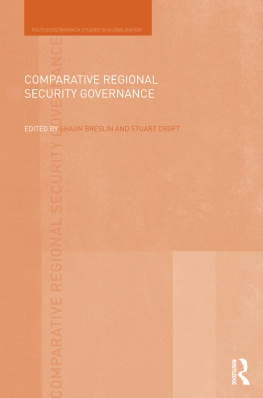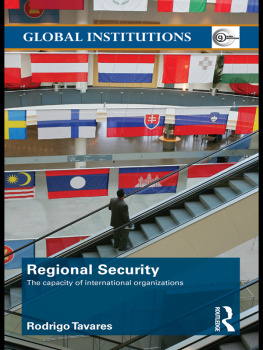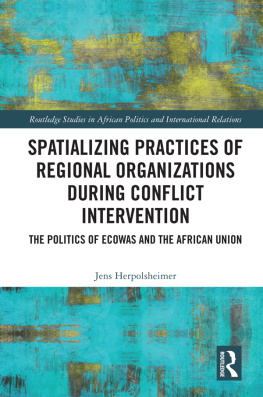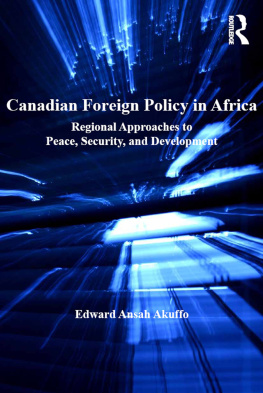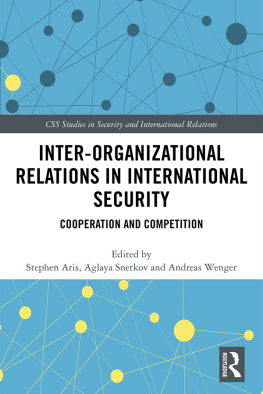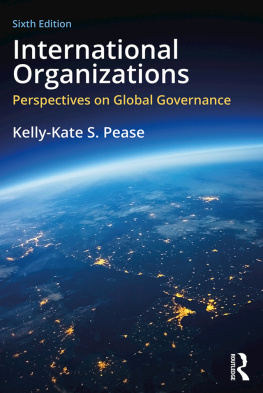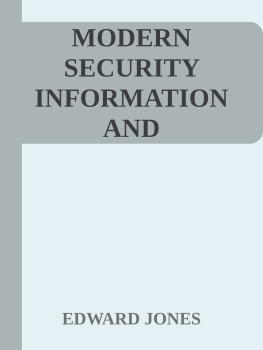Kirchner and Domnguez have done International Relations scholarship a great service. Under their editorial hand, security governance is deployed in a manner that marries rigorous theoretical application with empirical insight. Nowhere have I seen such a comprehensive overview of regional security organisations nor such an expert deployment of case study material. By extending the concept beyond its seemingly natural home in Europe and the North Atlantic, this volume makes clear that security governance is an idea whose time has come. It is not only a means toward understanding the practice of international organisation, but a method of organization itself. This volume is thus not merely of interest to scholars and students; it should be required reading for policy practitioners too.
Mark Webber, Professor of International Relations, University of Birmingham
Kirchner and Domnguez bring together an impressive collection of case-studies on how regional organizations all over the world are dealing with security governance and they provide a single and innovative analytical framework for analyzing the performance of the regional actors. The result is a major contribution to comparative regional integration studies as well as to a better understanding of security governance in todays multi-actor and multi-polar world. This is a must-read for all those interested in understanding how dealing with security is now institutionalized in a variety of ways across regional organizations.
Prof. Dr. Luk Van Langenhove, Director UNU-CRIS
The Security Governance of Regional Organizations is an impressive collection of essays. Using a common framework, twelve excellent surveys examine the role of regional organizations for international security governance. The empirically grounded and theoretically informed book deserves a wide readership among practitioners and scholars alike.
Professor Richard Higgott, Vice Chancellor, Murdoch University, Australia
The Security Governance of Regional
Organizations
The Security Governance of Regional Organizations assesses the effectiveness of regional organizations as regional or global security providers, and examines how policy preferences, resources, capabilities, institutional mechanisms and economic and political cohesion link with collective action behavior in four security policy functions. It investigates how regional organizations meet the new security threats or respond to strategic geopolitical changes and what adaptations they make in the process.
Divided into three parts and using a common analytical framework, the book explains the changing security agenda in ten key regional organizations. Each organizational chapter:
identifies the nature of threats within the region;
examines the historical development and the degree of institutionalization;
assesses the level of governance;
explores the context of interaction;
investigates the compliance with the norms of the system of governance.
This collection contributes to the ongoing reconceptualization of security and definition of security governance, and explores whether regional security governance processes are unique or similar and whether some organizational experiences can be seen as models for others to follow. It combines a coherent theoretical framework with strong comparative case studies, making it ideal reading for all students of security studies.
Emil J. Kirchner is Professor of European Studies and Jean Monnet Chair at the University of Essex. He is also Associate Editor of the Journal of European Integration .
Roberto Domnguez is Associate Professor in the Department of Government at Suffolk University, Boston. He is a research associate at the Miami European Union Center and was editor of the journal Relaciones Internacionales (UNAM, Mexico).
Routledge Global Institutions Series
Edited by Thomas G. Weiss
The CUNY Graduate Center, New York, USA
and Rorden Wilkinson
University of Manchester, UK
About the series
The Global Institutions Series is designed to provide readers with comprehensive, accessible, and informative guides to the history, structure, and activities of key international organizations as well as books that deal with topics of key importance in contemporary global governance. Every volume stands on its own as a thorough and insightful treatment of a particular topic, but the series as awhole contributes to a coherent and complementary portrait of the phenomenon of global institutions at the dawn of the millennium.
Books are written by recognized experts, conform to a similar structure, and cover a range of themes and debates common to the series. These areas of shared concern include the general purpose and rationale for organizations, developments over time, membership, structure, decision-making procedures, and key functions. Moreover, current debates are placed in historical perspective alongside informed analysis and critique. Each book also contains an annotated bibliography and guide to electronic information as well as any annexes appropriate to the subject matter at hand.
The volumes currently published are:
58 The Security Governance of Regional Organizations (2011)
edited by Emil J. Kirchner (University of Essex) and Roberto Domnguez
(Suffolk University)
57 The United Nations Development Programme and System (2011)
by Stephen Browne (FUNDS Project)
56 The South Asian Association for Regional Cooperation (2011)
An emerging collaboration architecture
by Lawrence Sez (University of London)
55 The UN Human Rights Council (2011)
by Bertrand G. Ramcharan (Geneva Graduate Institute of International and
Development Studies)
54 The Responsibility to Protect (2011)
Cultural perspectives in the Global South
edited by Rama Mani (University of Oxford) and Thomas G. Weiss
(The CUNY Graduate Center)
53 The International Trade Centre (2011)
Promoting exports for development
by Stephen Browne (FUNDS Project) and Sam Laird (University of
Nottingham)
52 The Idea of World Government (2011)
From ancient times to the twenty-first century
by James A. Yunker (Western Illinois University)
51 Humanitarianism Contested (2011)
Where angels fear to tread
by Michael Barnett (George Washington University) and Thomas G. Weiss
(The CUNY Graduate Center)
50 The Organization of American States (2011)
Global governance away from the media
by Monica Herz (Institute of International Relations, Catholic University,
Rio de Janeiro)
49 Non-Governmental Organizations in World Politics (2011)
The construction of global governance
by Peter Willetts (City University, London)
48 The Forum on China Africa Cooperation (FOCAC) (2011)
by Ian Taylor (University of St. Andrews)
47 Global Think Tanks (2011)
Policy networks and governance
by James G. McGann (University of Pennsylvania) with Richard Sabatini
46 United Nations Educational, Scienti fi c and Cultural Organization
(UNESCO) (2011)
Creating norms for a complex world
by J.P. Singh (Georgetown University)
45 The International Labour Organization (2011)
Coming in from the cold
by Steve Hughes (Newcastle University) and Nigel Haworth (University of
Auckland)
44 Global Poverty (2010)

